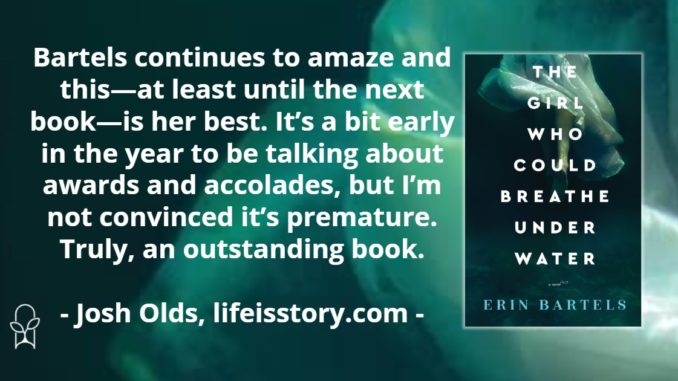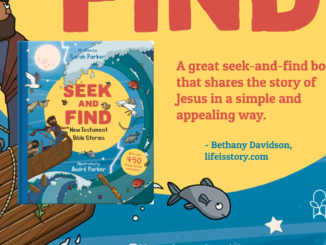
Also by this author: All That We Carried
Published by Revell on January 4, 2022
Genres: Fiction, Christian, General
Buy on Amazon
Goodreads

When Kendra Brennan moves into her grandfather's old cabin on Hidden Lake, she has a problem and a plan. The problem? An inflammatory letter from A Very Disappointed Reader that's keeping her from writing her next novel as long as its claims go unanswered. The plan? To confront Tyler, her childhood best friend's brother--and the man who inspired the antagonist in her first book--in order to prove to herself that she told the truth as all good novelists should.
What she discovers as she delves into the murky past is not what she expected. Facing Tyler isn't easy, but facing the truth of her failed friendship with his sister, Cami, may be the hardest thing she's ever had to do.
Award-winning novelist Erin Bartels searches the heart with this lyrical exploration of how a friendship dies, how we can face the unforgiveable, and how even those who have been hurt can learn to love with abandon.
I read the first chapter of The Girl Who Could Breathe Under Water, then put the book away for a bit. Part of it was to process the magnificent opening. Most of it was because I realized this was a book I’d want—no, need—to read in one sitting. The summer you chopped off all your hair, I asked your dad what the point of being a novelist was. He said it was to tell the truth. It’s not often that one line can draw me into a story, but let’s analyze—or maybe overanalyze—it a bit.
In the first line, we learn that this isn’t written for us but addressed to the enigmatic “you.” This immediately sets us up with a mystery (To whom is this story being told?) and furthers that mystery by leaving things unsaid and assumed, things that “you” would know but we do not. We also get the sense that this novel is an exploration of what it means to be a novelist. This could be a throwaway line or relegated to an unimportant subplot, but anyone who has read Bartels’ previous work (especially The Words Between Us) will know that it probably isn’t. This theme about literature and how it affects us is important to her. Then, lastly, we’re left with a contradiction. Fiction is meant to tell the truth, but fiction by definition is an invention. It’s imaginary. (But does that make it untrue?) All of these questions are set up in the first two sentences of the novel. And all the sentences that follow are an attempt at an answer.
The Girl Who Could Breathe Under Water follows Kendra, a young novelist returning to her grandfather’s lake house to finish her next novel and work with a translator on the German version of her debut novel. A lot of unexpected things happen at once. First, there’s all the memories of returning to a childhood haunt. Second, there’s the people—the ones that have been missed, the ones still missing, and the ones she only wished were missing. And third, there’s Andreas, her German translator. She’d been in a bit of a brain fog when she suggested that the translator come stay with her in the cabin and definitely was expecting an Andrea and not a tall, blond, and handsome Andreas.
Bartels takes the storyline in multiple directions, exploring each of these relationships. It seems all a bit much at first, and would be in less capable hands, but Erin balances it all with precision and grace. Flashbacks to the past explain her relationships with most of the people on the lake. The mysterious “you” is hinted at, but not officially revealed until the end. Possibly the book’s only weakness is that when the big reveal happened, I was so convinced of it I didn’t think it was supposed to be a mystery any longer.
It through it all, The Girl Who Could Breathe Under Water explores the idea of truth in fiction and how what we write about is influenced by what we’ve done (or what’s been done to us). She presents Story as a cathartic or therapeutic, a way of speaking about traumas and processing them but in a safe, controllable, fictionalized manner. We find out that Kendra’s fictionalization is based on her childhood and, specifically, how she was sexually abused and raped by a friend’s older brother. Returning to Hidden Lake means confronting that past and existing in the vicinity of her abuser.
It’s a difficult plotline for Christian fiction, a genre that generally shies away from any sexual content, but Bartels finds the correct balance between understating the horror of abuse and exploiting it. The abuse is clear, but Bartels doesn’t dwell on it or sensationalize it. And it also becomes the story of someone who isn’t being “abused,” as it might be legally defined, but who is being inordinately pressured into a sexual relationship. With statistics saying that 1 in 5 girls and 1 in 20 boys are a victim of child sexual abuse, and with the sexual abuse being uncovered in so many Christian circles, it may be a difficult topic, but it’s something we need to talk about. The Girl Who Could Breathe Under Water handles it in a sensitive manner that also explores how antagonists—the real ones anyway—have their own fleshed-out stories and tragedies. Not to condone their actions, but to help contextualize and understand the depth of brokenness.
Despite its heaviness, The Girl Who Could Breathe Under Water also has its moments of lightheartedness and romance. The whole storyline with Andreas—which at first seems like an unnecessary inclusion—provides a welcome humor and romance filled antidote to the rest of the story. Bartels also cleverly wraps it all up in a way that makes it more than just that, as well. Life is story and Erin Bartels’ books have always captured that. She writes relational fiction. It’s not thriller or mystery or suspense or romance, but in a way it’s all of those things because the relationship between two people can be all of those things. The Girl Who Could Breathe Under Water is no different. Bartels continues to amaze and this—at least until the next book—is her best. It’s a bit early in the year to be talking about awards and accolades, but I’m not convinced it’s premature. Truly, an outstanding book.



